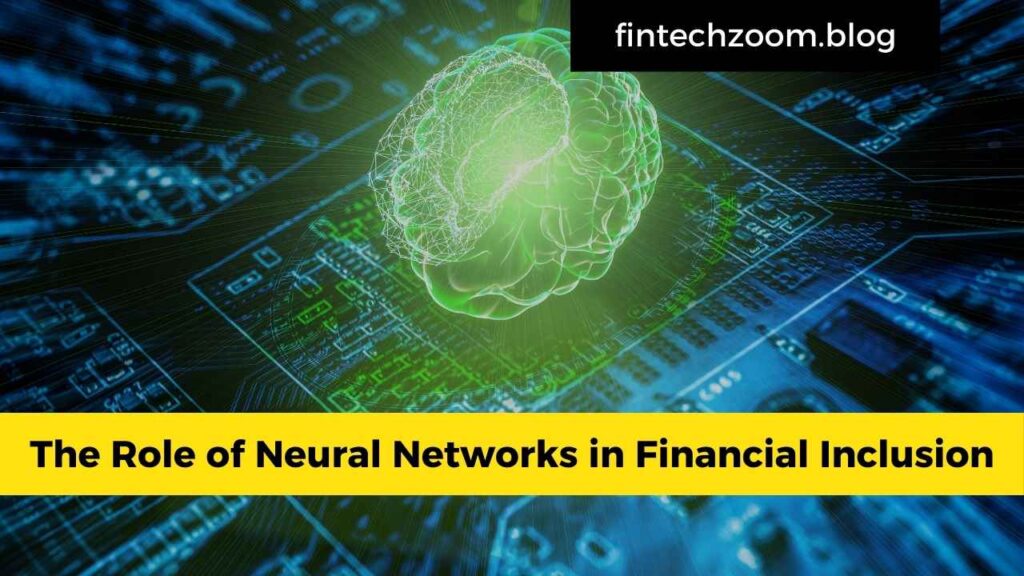Introduction
Fintech neural networks aren’t only a buzzword inside the economic enterprise—they’re at the vanguard of technological advancements that are reshaping the way financial services are introduced. But what exactly are those networks, and why are they so important to the future of finance?
Neural networks, inspired by way of the human brain’s shape, are a kind of artificial intelligence (AI) that excels at recognizing styles and making selections primarily based on good sized quantities of facts. In the realm of fintech, these networks are leveraged to enhance diverse financial tactics, from fraud detection to funding techniques. As the financial world turns into increasingly digital, the importance of neural networks keeps to grow, offering exceptional possibilities for innovation and performance.
But before diving into the intricacies of fintech neural networks, it is critical to recognize the basics of the way they work and why they may be so effective. By mimicking the way neurons within the brain system records, those networks can pick out complicated patterns and correlations that traditional algorithms may leave out. This functionality is mainly valuable in finance, wherein statistics is abundant, and the potential to make correct predictions can imply the difference between profit and loss.

The Building Blocks of Fintech Neural Networks
At the heart of fintech neural networks are layers of artificial neurons, every designed to procedure and analyze data in a manner that resembles the human mind’s features. These networks consist of an input layer, hidden layers, and an output layer, all running together to convert uncooked facts into actionable insights.
The enter layer gets the records, which then passes thru the hidden layers. Each hidden layer applies a fixed of weights and biases to the data, enabling the community to learn and adjust its predictions based on the patterns it identifies. Finally, the output layer gives you the community’s prediction or choice.
This manner of learning and adjusting is what makes neural networks so powerful in fintech. As they may be uncovered to greater statistics, they grow to be higher at making correct predictions, whether it is identifying fraudulent transactions or predicting stock market traits. The capability to examine from facts and improve through the years is what units neural networks aside from conventional algorithms.
Applications of Fintech Neural Networks
Fintech neural networks are being carried out throughout numerous sectors of the financial industry, reworking the way services are brought and improving efficiency. From banking to coverage, those networks are revolutionizing conventional economic procedures, making them faster, more correct, and greater steady.
One of the most enormous applications of neural networks in fintech is in fraud detection. By studying extensive quantities of transaction statistics, those networks can identify patterns that imply fraudulent interest, allowing economic institutions to take preventive measures earlier than any damage is done. This proactive method to fraud detection now not handiest saves cash however additionally complements purchaser trust.
Another area in which fintech neural networks are making a huge impact is in funding techniques. By reading ancient information and figuring out developments, these networks can offer traders with valuable insights, supporting them make greater knowledgeable choices. Whether it’s predicting stock prices or optimizing portfolio management, neural networks are getting an crucial device for investors.
The Role of Neural Networks in Fraud Detection
Fraud detection is one of the maximum essential programs of fintech neural networks, and for a great reason. Financial institutions deal with large quantities of facts every day, making them top goals for fraudulent sports. Traditional methods of detecting fraud often depend on rule-primarily based systems that can be inflexible and sluggish to conform to new sorts of fraud.
This is where neural networks come into play. By studying tremendous datasets in actual time, these networks can identify subtle styles and anomalies that might indicate fraudulent interest. For instance, a neural community can discover uncommon spending patterns on a credit score card that could advocate it’s been compromised. Once detected, the gadget can alert the economic group, permitting them to take on the spot action.
The advantage of the use of neural networks for fraud detection is their ability to examine and adapt. As fraudsters broaden new strategies, neural networks can speedy study from new data and modify their fashions as a consequence. This adaptability makes them some distance more powerful than traditional techniques, which regularly require guide updates to come across new forms of fraud.
Investment Strategies Powered with the aid of Neural Networks
Investing within the monetary markets has continually been a complex and volatile undertaking, however fintech neural networks are converting the sport. By reading historical information and identifying patterns, these networks can help investors make greater informed decisions, main to better returns and reduced risk.
One of the maximum exciting programs of neural networks in investing is in algorithmic buying and selling. These systems use neural networks to investigate market statistics in real time, figuring out trends and executing trades at most effective instances. The velocity and accuracy of those systems provide buyers a considerable edge, allowing them to capitalize on marketplace possibilities before they disappear.
But it is not pretty much velocity. Neural networks also excel at reading full-size quantities of records to pick out lengthy-term developments and opportunities. Whether it’s predicting the future overall performance of a stock or optimizing a portfolio to reduce hazard, neural networks offer investors with insights that could be not possible to obtain using conventional strategies.

Personalized Financial Services
In trendy competitive financial panorama, supplying personalised services is fundamental to keeping clients. Fintech neural networks are playing a vital role in this location, enabling economic institutions to tailor their offerings to man or woman consumer wishes and alternatives.
By analyzing purchaser statistics, neural networks can pick out styles in spending, saving, and investment behaviors. This information permits economic establishments to provide customized recommendation and merchandise that align with every customer’s precise monetary goals. For example, a neural network would possibly perceive that a patron is saving for a enormous buy and advise a tailor-made savings plan or investment product.
The capacity to offer personalized services now not best complements consumer satisfaction however additionally allows economic institutions construct more potent relationships with their customers. As clients get hold of offerings that are extra carefully aligned with their desires, they’re more likely to remain loyal to their economic organization.
Risk Management with Fintech Neural Networks
Risk management is a crucial element of monetary services, and fintech neural networks are presenting a brand new technique to handling chance. By reading large amounts of data, these networks can identify capability dangers and advise strategies to mitigate them, helping monetary establishments shield themselves and their customers.
One of the maximum massive blessings of using neural networks for threat management is their ability to analyze complex statistics units that conventional methods might conflict with. For example, a neural community can analyze market records, financial indicators, or even social media tendencies to discover potential risks to an funding portfolio. This complete analysis allows economic establishments to take proactive measures to mitigate danger.
The Future of Credit Scoring
Credit scoring is a crucial thing of the monetary industry, figuring out who receives get right of entry to to credit and at what phrases. Traditional credit score scoring fashions depend on a limited set of facts factors, which include credit score history and income, to decide someone’s creditworthiness. However, fintech neural networks are poised to revolutionize this method by way of thinking about a far broader variety of facts.
By analyzing data from various assets, consisting of social media, on-line transactions, or even smartphone usage, neural networks can create a more complete and correct image of a person’s creditworthiness. This method no longer simplest improves the accuracy of credit rankings however also opens up get admission to to credit score for individuals who could have been unnoticed via conventional models.
The use of neural networks in credit score scoring additionally has the potential to lessen bias in the credit approval system. By counting on statistics-driven insights as opposed to human judgment, those networks can make extra objective selections, assisting to ensure that credit is granted pretty.
Neural Networks in Financial Forecasting
Financial forecasting has usually been a hard undertaking, with countless variables that could effect marketplace tendencies and monetary situations. However, fintech neural networks are making it feasible to predict the unpredictable via studying giant quantities of facts and figuring out patterns that might in any other case go unnoticed.
Neural networks excel at processing complex information sets, such as historical marketplace data, economic indicators, or even geopolitical occasions. By studying those information points, they could pick out trends and correlations that can be used to make greater accurate monetary forecasts. For example, a neural community might analyze historical stock costs, financial records, and information articles to are expecting future marketplace movements.
The ability to make accurate forecasts is worthwhile in finance, wherein the distinction between a a success and unsuccessful funding can hinge on the capability to are expecting future traits. By leveraging the energy of neural networks, economic institutions can benefit a aggressive part and make greater knowledgeable decisions.

Enhancing Customer Support with Neural Networks
Customer support is a important component of the monetary enterprise, and fintech neural networks are improving the extent of carrier that economic establishments can provide. By studying patron facts and identifying styles, those networks can offer greater customized and green guide, improving the overall consumer enjoy.
One of the most full-size packages of neural networks in customer support is in the development of chatbots and virtual assistants. These structures use neural networks to recognize and respond to patron inquiries in real time, providing quick and correct solutions to common questions. By coping with recurring inquiries, those structures free up human sellers to consciousness on extra complicated problems, improving the efficiency of customer service operations.
Moreover, neural networks can analyze customer interactions to pick out traits and ability troubles. For instance, a neural community would possibly detect that a specific issue is affecting a big quantity of clients and alert the guide group to do so. This proactive method to customer support enables financial establishments cope with issues before they escalate, improving client delight.
Neural Networks and Regulatory Compliance
Regulatory compliance is a substantial mission for financial establishments, with complicated and ever-changing policies that must be adhered to. Fintech neural networks are assisting monetary establishments stay beforehand of the curve by way of automating the compliance process and making sure that every one sports are carried out according with regulatory necessities.
By reading information from diverse resources, consisting of transactions, communications, and market records, neural networks can perceive capability compliance issues and alert the relevant groups. For example, a neural network would possibly discover a suspicious transaction that might suggest cash laundering and flag it for similarly research.
The use of neural networks in regulatory compliance no longer most effective reduces the hazard of non-compliance but also improves efficiency by way of automating a number of the responsibilities that would in any other case require manual overview. This automation lets in financial establishments to cognizance on greater strategic sports, even as still making sure that they meet all regulatory requirements.
The Impact of Neural Networks on Insurance
The insurance industry is every other region in which fintech neural networks are making a good sized effect. By analyzing information from diverse resources, those networks are helping insurers make extra accurate underwriting selections and streamline the claims method, in the long run main to better effects for both insurers and policyholders.
In underwriting, neural networks can analyze a wide variety of information points, which includes ancient claims statistics, customer demographics, and even weather styles, to evaluate hazard more accurately. This facts-driven approach lets in insurers to rate policies more competitively even as nonetheless ensuring that they may be safely blanketed for ability losses.
In claims processing, neural networks can analyze claims statistics in real time to locate capability fraud and expedite legitimate claims. For instance, a neural network would possibly perceive patterns in claims statistics that recommend fraudulent hobby, such as multiple claims for the identical kind of loss. By flagging those claims for in addition research, insurers can lessen their publicity to fraud and enhance the performance of the claims system.
Neural Networks and Payment Processing
Payment processing is a essential thing of the monetary industry, and fintech neural networks are helping to make transactions faster and extra steady. By studying transaction statistics in real time, these networks can identify ability problems and ensure that payments are processed quick and as it should be.
One of the maximum significant programs of neural networks in payment processing is in fraud detection. By studying transaction information, neural networks can perceive styles that suggest fraudulent activity, which include uncommon spending patterns or transactions from unfamiliar locations. By flagging those transactions for in addition evaluate, financial establishments can save you fraud before it occurs, shielding both themselves and their clients.
Moreover, neural networks can also help to optimize fee processing through analyzing transaction records to discover bottlenecks and inefficiencies. For instance, a neural community would possibly hit upon that positive kinds of transactions are taking longer to procedure and advise methods to streamline the system. This optimization now not handiest improves the performance of charge processing however also enhances the consumer revel in by means of reducing delays.

The Role of Neural Networks in Financial Inclusion
Financial inclusion is a giant task in lots of elements of the sector, with hundreds of thousands of human beings missing get entry to to basic economic services. Fintech neural networks are helping to bridge this gap by means of imparting extra accurate and on hand financial services to underserved populations.
One of the most great programs of neural networks in financial inclusion is in credit score scoring. By reading information from numerous resources, inclusive of social media, online transactions, and even phone utilization, neural networks can create a extra comprehensive and accurate picture of someone’s creditworthiness. This technique now not best improves the accuracy of credit score ratings however also opens up access to credit for those who could have been left out via conventional fashions.
In addition to credit scoring, neural networks are also getting used to develop new monetary services and products which can be tailored to the wishes of underserved populations. For example, a neural community may analyze facts on spending styles in a selected community and propose a brand new financial savings product that meets their precise wishes. By presenting greater correct and accessible financial offerings, neural networks are helping to deliver extra people into the monetary system and promote financial development.
The Challenges of Implementing Neural Networks in Fintech
While fintech neural networks provide significant advantages, implementing them in monetary establishments isn’t with out demanding situations. From facts privateness worries to the complexity of integrating neural networks into current systems, there are numerous hurdles that must be conquer to completely realize the capability of this era.
One of the most giant challenges is data privacy. Neural networks require significant amounts of statistics to function efficiently, but this records often consists of sensitive records about customers. Ensuring that this information is accrued, saved, and utilized in a manner that complies with privacy guidelines is a vital challenge for economic institutions.
Another assignment is the complexity of integrating neural networks into existing structures. Many monetary establishments rely upon legacy structures that had been no longer designed to paintings with AI technology. Integrating neural networks into those systems may be complex and time-consuming, requiring extensive investment in both time and assets.
The Future of Fintech Neural Networks
The destiny of fintech neural networks is bright, with the capability to revolutionize the financial industry in approaches that were as soon as unattainable. As generation keeps to boost, the abilties of neural networks will best grow, enabling financial institutions to provide greater accurate, green, and personalized services.
One of the most thrilling possibilities for the future is the integration of neural networks with different emerging technologies, which include blockchain and quantum computing. By combining the power of neural networks with the safety and transparency of blockchain, for example, monetary establishments can expand new types of economic products and services that are each stable and efficient.
Moreover, as neural networks keep to adapt, they’ll turn out to be even greater adept at processing and analyzing data, main to even greater accurate predictions and insights. This will permit financial institutions to stay in advance of the curve and preserve to innovate in a hastily converting industry.
Real-World Examples of Fintech Neural Networks in Action
To simply recognize the effect of fintech neural networks, it’s beneficial to observe a few actual-international examples of ways they are getting used within the economic enterprise. From fraud detection to funding techniques, those achievement tales spotlight the electricity and ability of neural networks in fintech.
One tremendous example is using neural networks in algorithmic trading. Several economic companies have effectively carried out neural networks to investigate marketplace statistics in actual time and execute trades at best times. These systems had been shown to outperform conventional buying and selling techniques, leading to widespread income for the corporations that use them.
Another success story is the use of neural networks in fraud detection. Many economic institutions have carried out neural networks to research transaction data and pick out ability fraud. These structures have tested to be fairly powerful, appreciably lowering the occurrence of fraud and saving hundreds of thousands of bucks in losses.
Also Read: Fintech Zoom Ethereum: The Future of Finance 2024
Conclusion
Fintech Neural Networks are at the vanguard of a technological revolution this is remodeling the monetary enterprise. By leveraging the strength of AI and statistics, these networks are permitting economic institutions to offer extra accurate, efficient, and personalised offerings to their clients.
From fraud detection to funding techniques, the applications of neural networks in fintech are vast and sundry. As generation maintains to advance, the talents of these networks will best grow, leading to even extra sizeable innovations in the monetary industry.
However, the journey to fully imposing fintech neural networks isn’t without its challenges. From information privateness worries to the complexity of integration, economic establishments need to navigate numerous hurdles to absolutely understand the ability of this era. But for those that be successful, the rewards are significant, imparting a competitive facet in an increasingly more digital and information-driven world.
FAQ About Fintech Neural Networks
Q1:How are neural networks used in finance?
Ans: Neural networks in finance are primarily used for predictive analytics, risk management, and algorithmic trading. By analyzing vast amounts of financial data, these systems can identify patterns and trends, enabling more accurate predictions and decision-making processes.
Q2: What are the 5 key technologies in FinTech?
Ans: The five key technologies driving innovation in FinTech include artificial intelligence (AI), machine learning (ML), blockchain, big data analytics, and cloud computing. These technologies work together to enhance financial services, improve efficiency, and provide personalized customer experiences.
Q3: What is AI ML used for in FinTech?
Ans: AI and ML are leveraged in FinTech to automate processes, improve decision-making, and enhance customer interactions. From fraud detection to personalized financial advice, these technologies are transforming how financial services are delivered and consumed.
Q4: What is generative AI in FinTech?
Ans: Generative AI in FinTech refers to AI systems that can generate new data or content based on existing data sets. This technology is used in areas like financial modeling, where it can simulate market scenarios, and in customer service, where it can create personalized communication.
Q5: How does artificial intelligence affect fintech?
Ans: Artificial intelligence profoundly impacts FinTech by automating routine tasks, enhancing data analysis, and enabling more personalized financial products. It drives innovation in areas like fraud prevention, risk assessment, and customer engagement, making financial services more efficient and accessible.
Q6: How is machine learning used in fintech?
Ans: Machine learning is applied in FinTech to analyze large volumes of data, identify trends, and make predictions. It’s used in credit scoring, fraud detection, customer segmentation, and even in developing personalized financial products, making financial services smarter and more responsive.
Q7: What are the applications of AI in financial technology?
Ans: AI is applied across various aspects of financial technology, from automating customer service with chatbots to enhancing security through fraud detection systems. It also plays a significant role in investment management, credit scoring, and providing personalized financial advice, making financial services more efficient and user-friendly.


Thanks for the auspicious writeup. It actually was a leisure account it. Look complicated to more introduced agreeable from you! However, how can we be in contact?
Thank you for your kind comment! I’m glad you found the writeup enjoyable. If you’d like to get in touch, you can reach me at mahsanqureshi114@gmail.com. Looking forward to hearing from you!